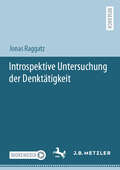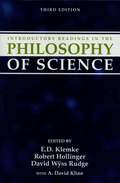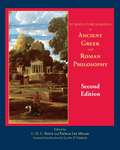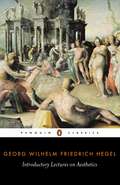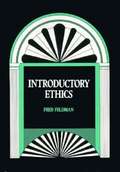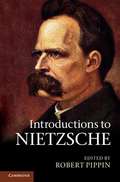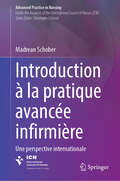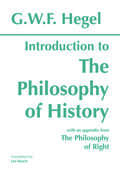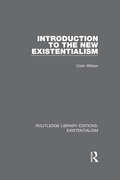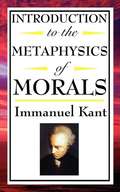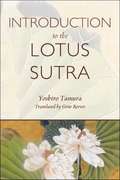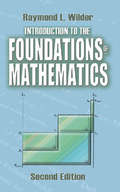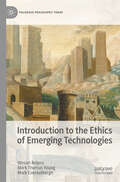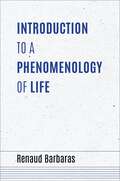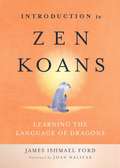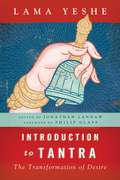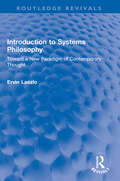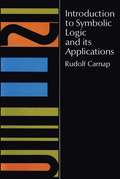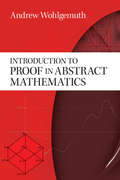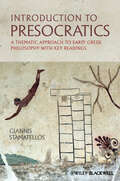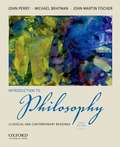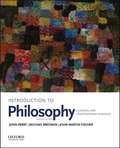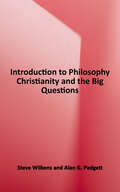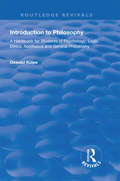- Table View
- List View
Introspektive Untersuchung der Denktätigkeit
by Jonas RaggatzIn diesem Buch wird untersucht, ob es eine eigenständige kognitive Phänomenalität gibt, die nicht auf sinnliche Erfahrungen reduziert werden kann. Um diese zentrale Frage der Kognitiven-Phänomenologie-Debatte introspektiv-empirisch untersuchen zu können, wird einerseits die Methode der Introspektion mit ihren Kritikpunkten und Problemen behandelt, indem historische und zeitgenössische Ansätze introspektiver Forschung sowie deren Kritik dargestellt und evaluiert werden. Andererseits wird eine qualitativ-empirische Studie zur Denktätigkeit durchgeführt, um performativ-agentive Phänomene aufzuzeigen, die als Argumente für eine sensorisch und emotional irreduzible kognitive Phänomenalität interpretiert werden können.
Introductory Readings in the Philosophy of Science
by E. D. Klemke Robert Hollinger David W. Rudge A. David KlineFor nearly two decades, "Introductory Readings in the Philosophy of Science" has distinguished itself as the standard for texts specifically designed to meet the needs of beginning students. Retaining the best essays from the first two editions, the editors have added ten important new selections to maintain this influential text's relevance for today and tomorrow. Readings cover such timely and important topics as feminism and the sciences, the effects of science on society, the natural versus the social sciences, and science and human values.
Introductory Readings in Ancient Greek and Roman Philosophy
by Lloyd P. Gerson C. D. Reeve Patrick Lee MillerA concise anthology for the ancient philosophy survey that ranges from the Presocratics through the Neoplatonists, Introductory Readings in Ancient Greek and Roman Philosophy features essential selections from C.D.C. Reeve's 2004 translation of Plato's Republic, which casts reported speech into direct dialogue, as well other translations known for their accuracy and accessibility. Introductions and notes are also included.
Introductory Lectures on Aesthetics
by Georg HegelNo philosopher has held a higher opinion of art than Hegel, yet nor was any so profoundly pessimistic about its prospects - despite living in the German golden age of Goethe, Mozart and Schiller. For if the artists of classical Greece could find the perfect fusion of content and form, modernity faced complicating - and ultimately disabling - questions. Christianity, with its code of unworldliness, had compromised the immediacy of man's relationship with reality, and ironic detachment had alienated him from his deepest feelings. Hegel's Introductory Lectures on Aesthetics were delivered in Berlin in the 1820s and stand today as a passionately argued work that challenged the ability of art to respond to the modern world.
Introductory Lectures On Aesthetics
by Georg Wilhelm Friedrich HegelNo philosopher has held a higher opinion of art than Hegel, yet nor was any so profoundly pessimistic about its prospects - despite living in the German golden age of Goethe, Mozart and Schiller. For if the artists of classical Greece could find the perfect fusion of content and form, modernity faced complicating - and ultimately disabling - questions. Christianity, with its code of unworldliness, had compromised the immediacy of man's relationship with reality, and ironic detachment had alienated him from his deepest feelings. Hegel's Introductory Lectures on Aesthetics were delivered in Berlin in the 1820s and stand today as a passionately argued work that challenged the ability of art to respond to the modern world.
Introductory Ethics
by Fred FeldmanClear, accurate presentation of the most important classical and contemporary theories in normative and metaethics–utilitarianism (act and rule), egoism, the categorical imperative, social contract theory, formalism, relativism (belief and conceptual), naturalism and non- naturalism, emotivism and prescriptive. Integrates thorough discussion of related concepts including justice, the will, autonomy, promises, punishment and universal law.
Introductions to Nietzsche
by Robert B. PippinFriedrich Nietzsche (1844–1900) is one of the most important philosophers of the last two hundred years, whose writings, both published and unpublished, have had a formative influence on virtually all aspects of modern culture. This volume offers introductory essays on all of Nietzsche's completed works and also his unpublished notebooks. The essays address such topics as his criticism of morality and Christianity, his doctrines of the will to power and the eternal recurrence, his perspectivism, his theories of tragedy and nihilism and his thoughts on ancient and modern culture. Written by internationally recognized scholars, they provide the interested reader with an up-to-date and authoritative overview of the thought of this fascinating figure.
Introduction à la pratique avancée infirmière: Une perspective internationale (Advanced Practice in Nursing)
by Madrean SchoberPublié sous les auspices du Conseil international des infirmières (CII), cet ouvrage offre une vue d’ensemble de la pratique avancée infirmière qui connaît actuellement un grand essor. Il aborde les questions centrales relatives aux fonctions regroupées sous cette appellation et au développement de ce type d’exercice. Ces questions sont fondamentales pour définir et distinguer la nature de la pratique avancée. Les sujets abordés comprennent la définition de ce type d’exercice, ses caractéristiques, le champ d’exercice, la formation préparant à un exercice en pratique avancée, la réglementation et la contribution apportée par la recherche. Les obstacles et les facilitateurs de l’exercice en pratique avancée sont présentés, y compris les questions éthiques qui se posent dans le contexte de son développement. Ce livre examine les développements internationaux dans ce domaine, comme le reflètent les études de cas et les exemples spécifiques à chaque pays. Il constitue une ressource précieuse pour les infirmières en pratique avancée, les enseignants, les responsables d’encadrement des établissements de santé. Ce livre a été traduit de l’anglais à l’aide d’une intelligence artificielle. Une révision du contenu a ensuite été effectuée par un expert du domaine.
Introduction to the Philosophy of History: with selections from The Philosophy of Right
by Georg Wilhelm Friedrich Hegel Leo Rauch. . . eminently readable . . . admirably picks up the spirit of what Hegel is saying. . . . more readable and accurate than Hartmann's, and it translates a more readable text than does Nisbet's. It includes (as Hartmann's does not) an excerpt, which serves as chapter five, from 'The Geographical Basis of History' (particularly interesting for what it says of America), and a brief chapter six, entitled 'The Division of History.' The volume closes with an appendix, translating §§341-360 of Hegel's Philosophy of Right and deals directly with the very concept of 'World History.' It constitutes a big help in coming to grips with what Hegel means by 'Spirit.' --Quentin Lauer, SJ, Fordham University, in International Philosophical Quarterly
Introduction to the New Existentialism (Routledge Library Editions: Existentialism #5)
by Colin WilsonColin Wilson revitalised existentialism with a completely new approach to the philosophy. The six volumes of his ‘Outsider’ series created an existentialism that is not paralysed by its own nihilism. This book, first published in 1966, is a clear summary of the ideas of the ‘Outsider’ cycle, and also develops them to a new stage. Wilson’s ‘new existentialism’ sees philosophy as an intellectual adventure that aims at a real command and control of human existence, and this book is its clearest exponent.
Introduction to the Metaphysics of Morals
by Immanuel KantAll duties are either duties of right, that is, juridical duties, or duties of virtue, that is, ethical duties. Juridical duties are such as may be promulgated by external legislation; ethical duties are those for which such legislation is not possible.
Introduction to the Lotus Sutra
by Gene Reeves Michio Shinozaki Yoshiro TamuraThe Lotus Sutra--one of the most popular Buddhist classics--is here accessibly introduced by one of its most eminent scholars."Soon after entering university in December of 1943, I was sent to the front as a student soldier. I wondered if I were allowed to bring but a single book on the trip, possibly to my death, which would I want to bring. It was the Lotus Sutra" -- from the author's Preface. Having developed a lifelong appreciation of the Lotus Sutra -- even carrying a dog-eared copy with him through service in World War II -- Yoshiro Tamura sought to author an introduction to this beloved work of Buddhist literature. Tamura wanted it to be different than other basic explorations of the text; his introduction would be plain-spoken, relevant and sensitive to modern concerns, and well-informed by contemporary scholarship. He succeeded marvelously with Introduction to the Lotus Sutra, which Gene Reeves -- Tamura's student and translator of the popular English edition of The Lotus Sutra -- translates and introduces in English for the first time here. Tackling issues of authenticity in the so-called "words of Buddha," the influence of culture and history on the development of the Lotus Sutra, and the sutra's role in Japanese life, Introduction to the Lotus Sutra grounds this ancient work of literature in the real, workaday world, revealing its continued appeal across the ages.
Introduction to the Foundations of Mathematics: Second Edition (Dover Books on Mathematics)
by Raymond L. WilderThis classic undergraduate text acquaints students with the fundamental concepts and methods of mathematics. In addition to introducing many historical figures from the 18th through the mid-20th centuries, it examines the axiomatic method, set theory, infinite sets, groups, intuitionism, formal systems, mathematical logic, and other topics. 1965 second edition.
Introduction to the Ethics of Emerging Technologies (Palgrave Philosophy Today)
by Mark Coeckelbergh Wessel Reijers Mark Thomas YoungIntroduction to Ethics of Emerging Technologies offers a set of lecture and seminar course materials for teaching ethics of emerging technologies. It covers the field in a comprehensive and accessible manner, emphasizing storytelling and examples, practical approaches and tools, and interactive assignments. The book addresses historical and current discourses, both academic and practical, related to the ethics of emerging technologies. This includes a basic introduction to normative ethics and applied ethics of technology, an accessible entry point to theories of technology and normativity, particular technological themes (engineering ethics, ethics of AI, and ethics of biotechnologies), as well as societal contexts in which emerging technologies play a pivotal role (citizenship, sustainability, and global inequality). This book is a must-read for science and engineering students who want to engage with the ethical impacts of their future work and research; for philosophy students who want to know more about emerging technologies; for researchers and educators interested in developing technology ethics curricula; and for general readers interested in the topic.
Introduction to a Phenomenology of Life (Studies in Continental Thought)
by Renaud BarbarasIn Introduction to a Phenomenology of Life, renowned French philosopher Renaud Barbaras aims to construct the basis for a phenomenology of life. Called an introduction because it has to deal with philosophical limits and presuppositions, it is much more, as Barbaras investigates life in its phenomenological senses, approached through the duality of its intransitive and transitive senses. Originally published in French (Introduction à une phénoménologie de la vie) Introduction to a Phenomenology of Life first defines the problem of life phenomenologically, then studies the failures of the phenomenological movement to adequately think about life, and finally elaborates a new, original, and productive approach to the problem. Combining original interpretations and expert readings of philosophers such as Heidegger, Henry, Bergson, and Merleau-Ponty, Barbaras offers a powerful and important contribution to phenomenology and continental thought.
Introduction to Zen Koans: Learning the Language of Dragons
by James Ishmael FordAn indispensible guide to koans, teaching the reader about the importance of lineage, the practice of “just sitting,” and koan practice as paths to awakening.“This marvelous book opens the treasure house of Zen and yet, happily, does not dispel its mystery. James Ford, an excellent storyteller and longtime Zen practitioner, presents a detailed and beautiful description of the craft of zazen, including “just sitting” and various forms of breath meditation—but focuses primarily on koan introspection. The power of koans, these 'public cases' from China, has never ceased to enrich my own experience of Zen. They are a medium of exploration of the history, culture, and view of Zen, but most importantly are a medium of awakening. James Ford is fundamentally a koan person, and for this, the book is particularly rich, opening the practice of koans in a splendid way. I am grateful for his long experience as a teacher and practitioner of this rare and powerful practice. Since the word koan has found its way into popular English usage, I am grateful too for the more nuanced and fertile view of koans that Ford presents. His definition of the word is telling: “a koan points to something of deep importance, and invites us to stand in that place.” He has also has created a wonderful translation of the Heart Sutra, Zen’s central scripture—and carefully opens up the heart of the Heart Sutra through scholarship and practice. Rich in textual sources and woven throughout with the perspectives of contemporary teachers, Introduction to Zen Koans sheds new light on ancient teachings. Through it, the reader will discover the importance of lineage, the traceless traces of the Zen ancestors, and the places of “just sitting” and koan practice as paths to awakening, as the great doorways into Zen.” —from the foreword by Joan Halifax
Introduction to Tantra
by Lama Thubten YesheWhat is tantra? Who is qualified to practice it? How should it be practiced? What are the results? According to Buddhism, every human being has the potential to achieve profound and lasting happiness. And according to the tantric teachings of Buddhism, this remarkable transformation can be realized very quickly if we utilize all aspects of our human energy - especially the energy of our desires. Introduction to Tantra is the best available clarification of a subject that is often misunderstood. This new edition of this classic text includes a new foreword by Philip Glass and a new cover design, but leaves untouched Lama Yeshe's excellent original text, edited by Jonathan Landaw. Tantra recognizes that the powerful energy aroused by our desire is an indispensable resource for the spiritual path. It is precisely because our lives are so inseparably linked with desire that we must make use of desire's tremendous energy not just for pleasure, but to transform our lives. Lama Yeshe presents tantra as a practice leading to joy and self-discovery, with a vision of reality that is simple, clear, and extremely relevant to twenty-first century life.
Introduction to Systems Philosophy: Toward a New Paradigm of Contemporary Thought (Routledge Revivals)
by Ervin LaszloFirst Published in 1972, Introduction to Systems Philosophy presents Ervin Laszlo’s first comprehensive volume on the subject. It argues for a systematic and constructive inquiry into natural phenomenon on the assumption of general order in nature. Laszlo says systems philosophy reintegrates the concept of enduring universals with transient processes within a non-bifurcated, hierarchically differentiated realm of invariant systems, as the ultimate actualities of self-structuring nature. He brings themes like the promise of systems philosophy; theory of natural systems; empirical interpretations of physical, biological, and social systems; frameworks for philosophy of mind, philosophy of nature, ontology, epistemology, metaphysics and normative ethics, to showcase the timeliness and necessity of a return from analytic to synthetic philosophy. This book is an essential read for any scholar and researcher of philosophy, philosophy of science and systems theory.
Introduction to Symbolic Logic and Its Applications
by Rudolf CarnapA clear, comprehensive, and rigorous treatment develops the subject from elementary concepts to the construction and analysis of relatively complex logical languages. It then considers the application of symbolic logic to the clarification and axiomatization of theories in mathematics, physics, and biology. Hundreds of problems, examples, and exercises. 1958 edition.
Introduction to Proof in Abstract Mathematics
by Andrew WohlgemuthThe primary purpose of this undergraduate text is to teach students to do mathematical proofs. It enables readers to recognize the elements that constitute an acceptable proof, and it develops their ability to do proofs of routine problems as well as those requiring creative insights. The self-contained treatment features many exercises, problems, and selected answers, including worked-out solutions. Starting with sets and rules of inference, this text covers functions, relations, operation, and the integers. Additional topics include proofs in analysis, cardinality, and groups. Six appendixes offer supplemental material. Teachers will welcome the return of this long-out-of-print volume, appropriate for both one- and two-semester courses.
Introduction to Presocratics: A Thematic Approach to Early Greek Philosophy with Key Readings
by Giannis StamatellosIntroduction to Presocratics presents a succinct introduction to Greek thinkers of the 6th and 5th century BCE and a thematic exploration of the topics and enquiries opened by these first philosophers and scientists of the Western tradition. Offers a concise, thematically organized introduction to the Presocratics Includes a previously unpublished translation of the main fragments of the Presocratics by Classics scholar Rosemary Wright Covers key figures including Thales, Anaximander and Anaximenes of Miletus, Xenophanes, Heraclitus, Pythagoras, Parmenides and Zeno of Elea, Empedocles, Anaxagoras and Democritus Supplemented with helpful features including a timeline, map of the ancient world, glossary of terms, and index of proper names
Introduction to Philosophy: Classical and Contemporary Readings
by John Perry Michael Bratman John FischerIntroduction to Philosophy: Classical and Contemporary Readings, Sixth Edition, is the most comprehensive topically organized collection of classical and contemporary philosophy available. The text includes sections on God and evil, knowledge and reality, the philosophy of science, the mind/body problem, freedom of will, consciousness, ethics, political philosophy, existential issues, and philosophical puzzles and paradoxes.
Introduction to Philosophy: Classical and Contemporary Readings
by John Perry Michael Bratman John Martin FischerIntroduce your students to philosophy with the most widely used, trusted, and comprehensive topically organized collection of classical and contemporary readings available. <P><P>Easy to use for both students and instructors, Introduction to Philosophy: Classical and Contemporary Readings incorporates boldfaced key terms (listed after each reading and defined in the glossary), a "Logical Toolkit," a guide to writing philosophy papers, and study questions after each reading selection. The eighth edition features nine new selections that broaden the book's scope to include work by non Western philosophers and contemporary women philosophers.
Introduction to Philosophy: Christianity and the Big Questions
by Steve Wilkens Alan G. PadgettAsking "big questions" is fundamental to our humanity. What is the meaning and purpose of life? What is truth? How do we know what we claim to know? What is justice? What happens after death? Veteran teachers Steve Wilkens and Alan Padgett guide readers to wrestle with twelve of the most foundational, philosophical questions facing humanity, and they reflect on these big questions with a lens rooted in faith. Christians, according to Wilkens and Padgett, should embrace their ability to probe these questions that have occupied some of the most brilliant minds in history. Instead of avoiding hard questions, a Christian approach to philosophy begins with the conviction that God invested humanity with a restless mind. From an early age, we are riddled with curiosity about the world, our place in it, and how the whole of it fits together. <p><p>As Wilkens and Padgett show, questions about the inner world of our being are tied to the outer world which includes the entire created cosmos and God. Like all good gifts, the gift of questions comes with a challenge--of responsibility and hard thinking. We have a spiritual duty to pursue life's deepest queries with virtue, fairness, reason, and, above all, a sense of worship and gratitude. Introduction to Philosophy: Christianity and the Big Questions is a perfect primer for students of philosophy and anyone interested in a Christian perspective on the timeless and universal perplexities of human existence.
Introduction to Philosophy: A Handbook for Students of Psychology, Logic, Ethics, Aesthetics and General Philosophy (Routledge Revivals)
by Oswald KülpeFirst published in 1927, this translation of Kulpe’s ‘Einleitung in die Philosophie’, 1895, covered psychology, logic, ethics, esthetics and general philosophy. The author adopted a uniform approach of positivity, interest and impartiality, aiming his work at a wider public than students of philosophy. The volume was intended as an elementary but complete guide to philosophy, past and present and included facts and arguments previously confined to philosophical encyclopaedias.
